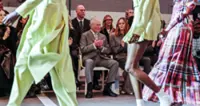Female African-American influencers are reviving the spirit of gyaru culture, a Japanese subculture that was extremely popular in the 1990s.
With colourful clothing, exaggerated face contouring and oversized eyelashes, these women are borrowing from the aesthetic that made gyaru so successful back in the day.





